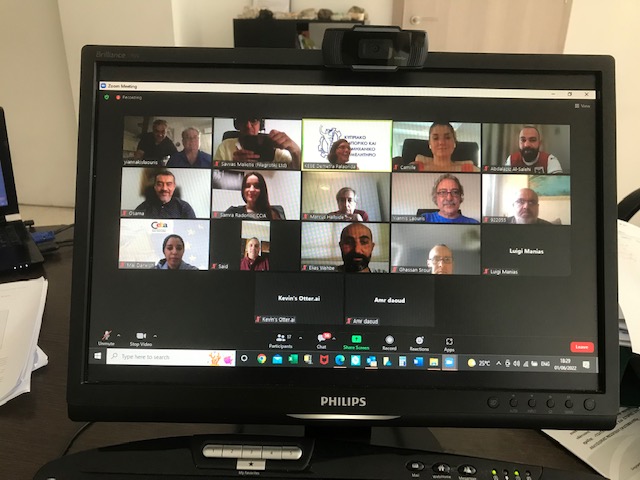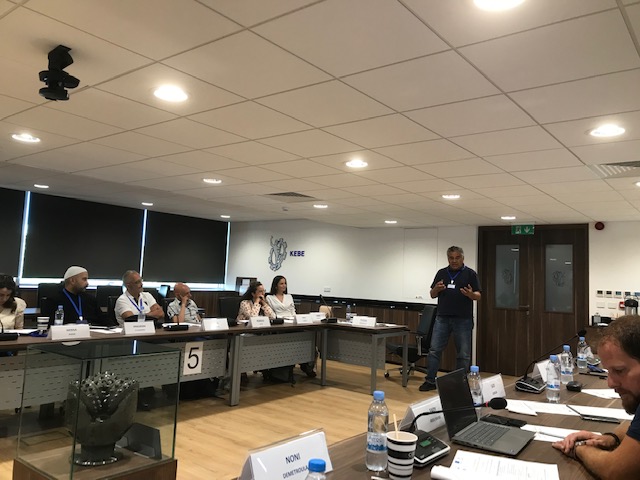|
Workshops - Democratic Dialogue
 Partners and their external experts have just completed the first cycle of train-the-trainer course on the concept of Structured democratic dialogue, a tool they are about to use in supporting the creation of bee clusters for regional development. This first part consisted of four online sessions during which an experienced trainer on structured democratic dialogue, Mr Yiannis Laouris, introduced experts from the participating regions in the tools and methodology of this approach for bringing people together around common goals and solutions. Partners and their external experts have just completed the first cycle of train-the-trainer course on the concept of Structured democratic dialogue, a tool they are about to use in supporting the creation of bee clusters for regional development. This first part consisted of four online sessions during which an experienced trainer on structured democratic dialogue, Mr Yiannis Laouris, introduced experts from the participating regions in the tools and methodology of this approach for bringing people together around common goals and solutions.
The train-the-trainer course will be completed in Cyprus, at a two-day course during which partners and expert trainers from Sardinia (Italy) , Palestine, Alexandria (Egypt) , and Bekaa Valley (Lebanon) will be guided into the concept of structured democratic dialogue and have the opportunity to capitalize on a previous ENI CBCMED project (MEDFEST), during which the regional bee cluster of ‘Melissochoria’ at ‘Orini Larnaka’ (Cyprus) were created.
For more information on the methodology of structured democratic dialogue, click on:
_______________________________________________________________________________________
Bees & regional cluster development based on the methodology of structured democratic dialogue
MedbusineessHubs Project capitalises on the success of MEDFEST (Interreg-Med project)
As its name implies, structured democratic dialogue is a scientific and well-tested methodology for large-scale, collaborative discussion, which is effective in:
- resolving multiple conflicts and problems that are more and more complex in a reasonably limited amount of time;
- gathering the collective wisdom of diverse stakeholders who experience a challenge;
- assisting heterogeneous groups with conflicting opinions and interests in collectively developing a common framework of thinking based on consensus building and thus achieving results.
Cypriot partners and stakeholders used this methodology in 2018 during the Interreg-Med MEDFEST project in order to develop the honeybee cluster of villages at Orini Larnaka rural region.
This success story is today used up by the MedBusinessHubs project to support the  development of honeybee clusters in the partner regions of Egypt, Italy, Lebanon and Palestine. Stakeholders and trainers from these regions gathered in Cyprus during a 2-day train-the-trainer course with the purpose of transferring the good practise of the methodology in developing the honeybee clusters in their selected specific rural regions. After the completion of this training workshop, trainers in partner regions, in cooperation with their partner organisations, will organise workshops based on the methodology of structured democratic dialogue with the purpose of identifying the obstacles and determining the vision for regional honeybee cluster formations. development of honeybee clusters in the partner regions of Egypt, Italy, Lebanon and Palestine. Stakeholders and trainers from these regions gathered in Cyprus during a 2-day train-the-trainer course with the purpose of transferring the good practise of the methodology in developing the honeybee clusters in their selected specific rural regions. After the completion of this training workshop, trainers in partner regions, in cooperation with their partner organisations, will organise workshops based on the methodology of structured democratic dialogue with the purpose of identifying the obstacles and determining the vision for regional honeybee cluster formations.
During the train-the-trainer workshop, participants were asked to imagine an ideal future in their rural area, where all development is sustainable, responsible, and secures prosperity for all local people. In this context they were asked to describe this visionary future by answering the triggering question: What are descriptors/characteristics of an ideal sustainable, responsible development in our rural areas that secures prosperity for all local people? The concept of a triggering question is a crucial ingredient in the structure democratic dialogue and participants showed an active involvement in understanding the rules and tools of the methodology.
The next step is to carry this knowledge and apply it in their regions, for the benefit of the honeybee and the local people, aligning these with the necessity of sustainable rural growth.
|